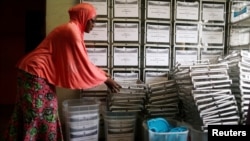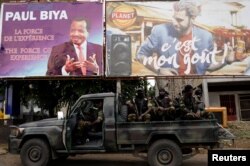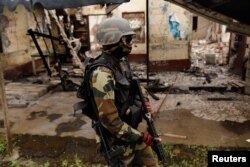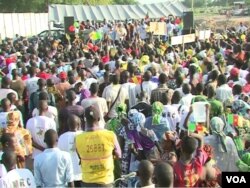Cameroon is preparing for a presidential election Sunday despite security challenges in three parts of the central African state. Thousands of polling stations in the country’s restive English-speaking regions and the Boko Haram-prone north have been relocated. But after 36 years of President Paul Biya, many voters are skeptical their vote even counts.
Biya sent Cameroon’s minister of agriculture, Henry Eyebe Ayissi, to campaign for him in Monatele, a town near the capital, where he spoke to a crowd.
Mercy Nkwenti, a teacher who escaped violence in her town Bamenda, capital of the English-speaking northwest, attended the event. She said on her way to Yaounde, armed men ambushed their bus and seized her voter card.
"What they said is ‘Why are you guys voting? You already know the winner. Why should you waste time to vote?’ So they took it," she said.
Nkwenti said she does not know if the armed men were separatists who have vowed to disrupt the presidential election.
Despite the threats, she said she would still vote if allowed because Cameroon needs a change of leadership.
But not all Cameroonians are as keen on the election as Nkwenti. Cameroon’s National Institute of Statistics says there are 13 million potential voters in the country, but only half the population has registered to vote.
Thirty-seven-year old electrician Emmanuel Ngah refused to register. He said he has no confidence in the elections management body. He noted cynically that all of the election officials are appointed by President Biya, who is himself a candidate and one of Africa’s longest ruling leaders with 36 years in office.
"My own problem is that I do not have a voter’s card and even if I had, there would be no need for me to vote because nothing would change from the way I see," he said. "We do not know if we are going in front or behind."
Troubled regions
Few are expected to vote in Cameroon’s troubled English-speaking regions, where separatists are fighting for an independent state. And election observers are reluctant to visit the areas of unrest, which could put the legitimacy of the vote into question.
Felix Monono, an election observer with the Center for Research on Governance, said the separatists "even issued an embargo that there should be no movement."
"If you are caught, they may kill you, they may kidnap you," he said. "And then secondly, the security [personnel] who are there they are like a big threat because they are trying to control movement and at times they are also very hostile to people who are around. So we are not very sure of what can happen."
Along the northern border with Nigeria, Cameroonian authorities moved more than ten polling stations to locations safe from Boko Haram, even though there has been no major violence in the past year. But authorities’ fear the Islamist militant group could be provoked by Sunday’s election.
Eight presidential candidates are challenging Biya, who is seeking a fresh seven-year mandate. But faced with a divided opposition, he is widely expected to win.







